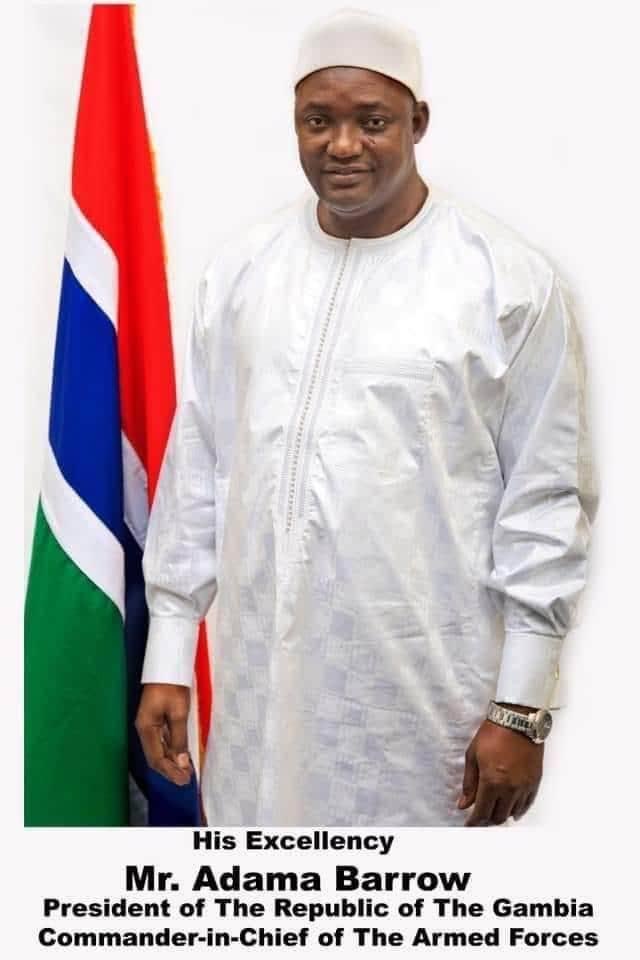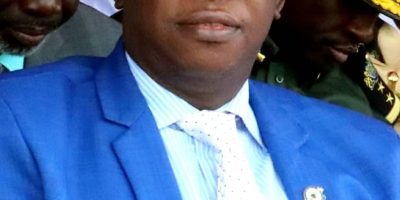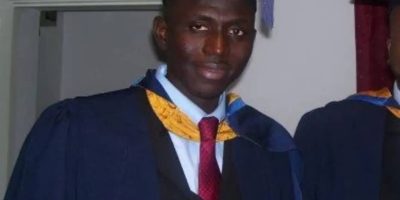Alagi Yorro Jallow
 Fatoumatta: In the Presidential Election of December 4, 2021, the Gambian people have provided President Adama Barrow and this administration with a clear mandate to accelerate inclusive economic growth and act with greater urgency to tackle poverty improve government services, and fight corruption, and end state capture. Suppose President Adama Barrow starts his legitimate presidential mandate and governs the country construct with the deep state career loyalists of workers to solidify his new administration. In that case, President Barrow needs a capable, efficient, and ethical government with some of the reconfigurations of national development. Therefore, the structure and size of the government must be optimally suited to meet the needs and aspirations of the people and ensure the most efficient allocation of public resources.
Fatoumatta: In the Presidential Election of December 4, 2021, the Gambian people have provided President Adama Barrow and this administration with a clear mandate to accelerate inclusive economic growth and act with greater urgency to tackle poverty improve government services, and fight corruption, and end state capture. Suppose President Adama Barrow starts his legitimate presidential mandate and governs the country construct with the deep state career loyalists of workers to solidify his new administration. In that case, President Barrow needs a capable, efficient, and ethical government with some of the reconfigurations of national development. Therefore, the structure and size of the government must be optimally suited to meet the needs and aspirations of the people and ensure the most efficient allocation of public resources.
The Constitution places the power of the Executive in one person, the President of the Republic of the Gambia, President Adama Barrow. Nonetheless, the Constitution also requires that cabinet ministers, special advisers, and heads of parastatals be appointed to help the President carry out the huge responsibility of executing government policies. The problem with good governance is that if you do not make deep state loyalists political appointments, professional civil servants will make all the political decisions, including the most crucial decision not to make policy advisory decisions and policy process and policy advice formations.
Fatoumatta: The slow pace of good governance under President Barrow’s first cabinet pick directly resulted from his decision not to make most deep state loyalists political appointments that were due. It is well known that when civil servants are in control, they do not want to make decisions so that they do not get noticed or disturbed as they enjoy the perquisites of power, including the most harmful one of looting public funds. When, therefore, the President does not appoint loyal people to govern, those at the head of governmental organizations create forms of governance linked to prolonging their temporary positions. Achieving government policy goals cannot be their priority because their logic is that they are there for a short time until the President decides who should do the job on a full-time basis. As tenures of temporary heads extend from months to years, confusion becomes the game’s name. The temporary heads begin to envisage permanency on the jobs and, above all, start working towards it. This means investing public funds at their disposal to oil the process of retaining their positions, and we all know what that means. Today, the time for the show begins as the politicians come into the field and start expressing themselves and acting on what they consider to be the tragedy of winning an election and being kept out of power.
Fatoumatta: In undertaking his second term, President Adama Barrow must be guided by the need to build a modern developmental state that can drive economic and social transformation, embrace innovation, and direct effort and resources towards where they will have the most significant impact.
All Gambians are acutely aware of the tremendous economic difficulties our country has been experiencing and the constraints on public finances.
Therefore, it is imperative that in all areas and spheres of government, President Adama Barrow and his new administration must prioritize revitalizing the economy while exercising the most excellent care in using public funds. Furthermore, President Barrow must this time combine several portfolios to promote greater coherence, better coordination, and improved efficiency, thereby reducing the number of Cabinet Ministers and Special advisers in this administration.
For example, the Ministry of Finance Trade and Industry is combined with Economic Affairs. Ministry of Higher Education, Basic education and Research, to integrate Science and Technology. The Ministry of Agriculture, Environment to be combined with Forestry, Fisheries, and National Assembly Matters. The Ministry of Tourism and Arts and Culture merged with Youth and Sports. The Ministry of Communications and Telecommunications, Transportation and Infrastructure portfolios, and Public Works portfolios be merged into one Ministry. In addition, to add responsibility for Employment to the Labor portfolio.
Suppose President Barrow makes adequate progress in building the Gambia socio-economic development needs. In that case, President Barrow and his team must deploy responsible people who are committed, capable, hard-working, and have government and political integrity.
In appointing a new national executive, President Adama Barrow must consider a number of considerations, including cognitive skills, character, experience, continuity, competence, generational mix, and demographic and regional diversity.
Fatoumatta: The people President Barrow shall appoint in his new administration should realize that the expectations of the silent majority to the unvaxxed minority of the Gambian people have never been greater and that they must shoulder a great responsibility. Accordingly, their performance – individually and collectively – will be closely monitored against specific outcomes. Where implementation is unsatisfactory, action will be taken.
The President’s men and women to be appointed to the Executive should be drawn from all corners of our country, including women and a significant number of young people. This will fulfill his commitment to giving young people roles of responsibility in all sectors of society. This is part of a generational transition. Gambians are creating a pipeline of leaders to take our country further into the future. President Adama Barrow must continue to value experience, skills, and contribution and will give his team suitable responsibilities where they will be able to serve the nation.
However, President Barrow should not delay the reconstitution of policymaking bodies and institutions to (a) the slow pace at which his lieutenants operated, reflecting the Gambia’s diversity in top-level appointments.
Fatoumatta: The President must not be left out of the pressure he faced from all sides of his coalition partners and his political party’s inner circles as he tried to fill critical positions in government. This was one of the factors President Adam Barrow faced at the end of the 2016 presidential election and at the beginning of picking his Cabinet Ministers and key foreign service appointments. Therefore, president Barrow has to achieve a way forward in establishing a new institutional framework for the evaluation and selection of potential candidates for key positions since President Barrow anticipated that he would be overwhelmed with demands for patronage from political Godfathers and job lobbyists and that if he failed to manage the demands properly, Godfathers and lobbyists would either take control or continue to blackmail President Adama Barrow. I wonder if President Barrow realizes that those around him are far more interested in helping themselves and their family and friends than working towards the success of his administration or serving the Gambia.
As anticipated, those who felt “marginalized” have started showing resentment. This is most unfortunate. The President should not have to answer to anybody he picks for top slots, not even coalition partners and godfathers. Instead, he is now placed on the defensive because he did not move quickly to change the game’s rules, specifically, to take politics and power play out of senior-level recruitment.
Fatoumatta: Agreed, President Barrow cannot do everything by himself. He cannot single-handedly change the rules of the game. He needs competent and truly loyal lieutenants. To the extent that he made little effort to headhunt such lieutenants, he would have to accept responsibility for the quagmire the struggle for patronage creates. For now, we have to watch from the sidelines how the traditional, rub-my-back, rub-your-back rules dictate the outcome of the “game.”




Ma sha Allah great and thanks for sharing